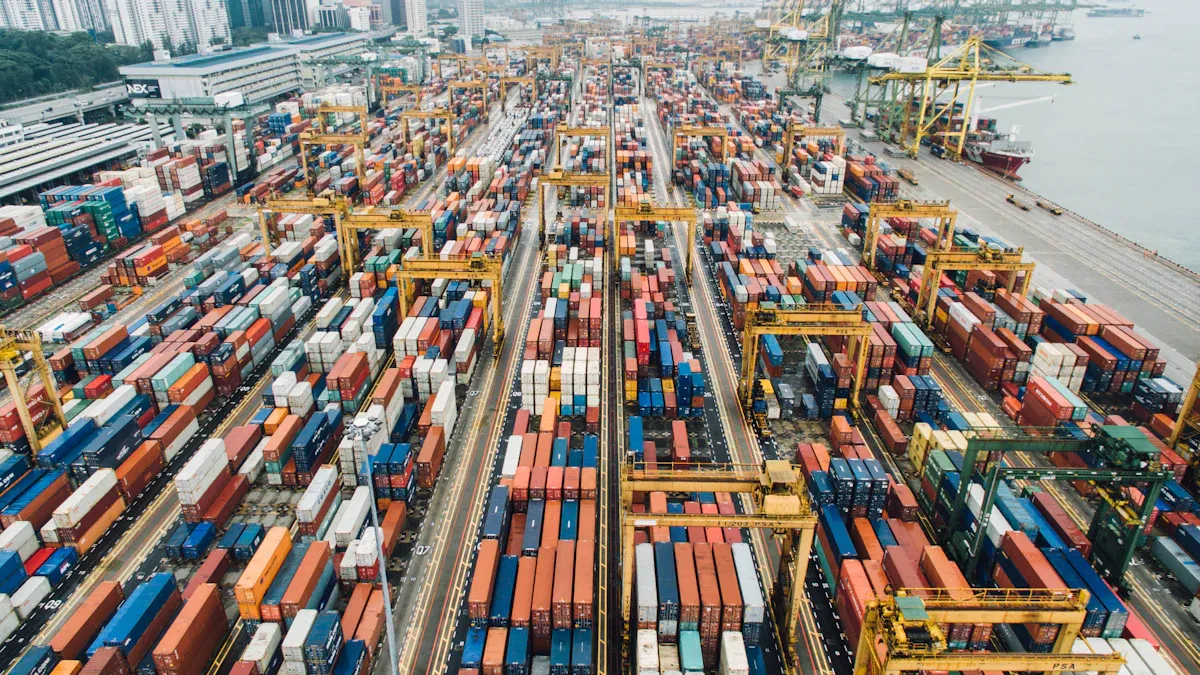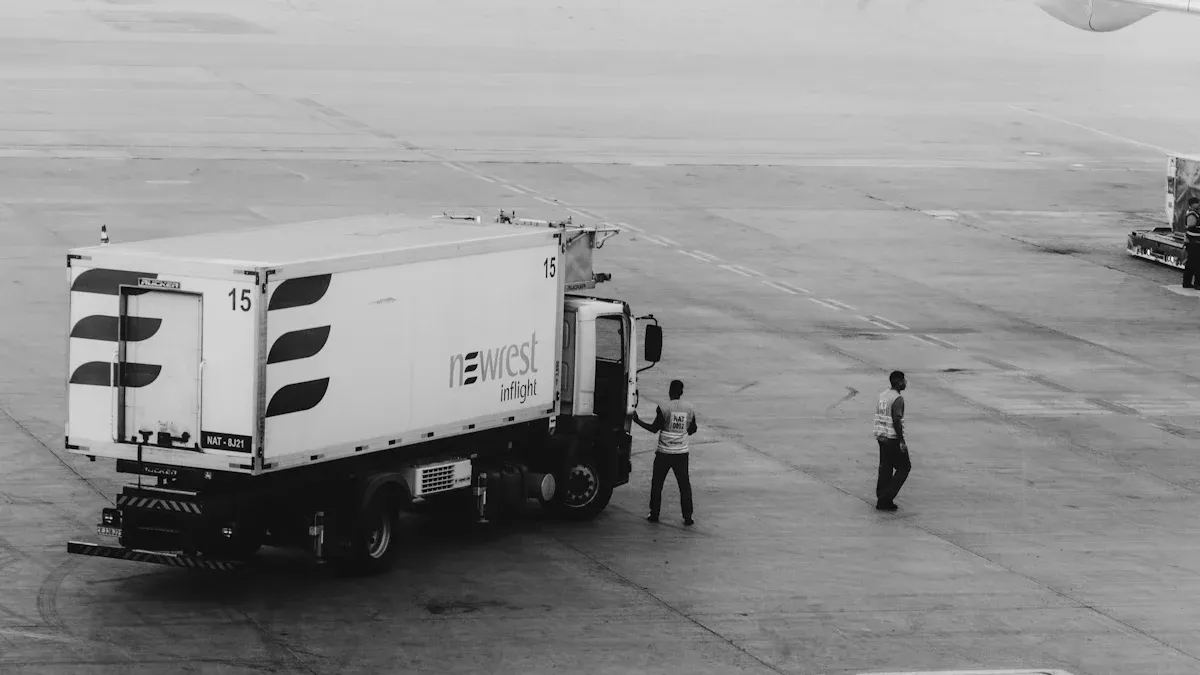What Does a Logistics Broker Do and Why Are They Important

You rely on logistics brokers to connect your business with trusted carriers who deliver your goods on time. These professionals use strong negotiation skills to secure competitive shipping rates and help you save money. Logistics brokers complete guide your shipments from start to finish, making sure you avoid costly delays.
Over 20% of all over-the-road freight in the United States is managed by logistics brokers.
Broker networks help you respond quickly to changing fuel costs, busy seasons, and supply chain disruptions.
Key Takeaways
Logistics brokers connect businesses with reliable carriers, saving you time and effort in finding the right shipping options.
They negotiate competitive shipping rates using market knowledge, helping you reduce transportation costs significantly.
Brokers oversee the entire shipping process, providing real-time updates and managing any issues that arise during transit.
Choosing the right logistics broker involves checking their experience, technology use, and communication skills to ensure they meet your needs.
Working with a logistics broker gives you access to a larger network of carriers, increasing your chances of finding the best shipping solutions.
Logistics Brokers Complete Guide: Key Roles

Connecting Shippers and Carriers
You depend on logistics brokers to match your shipments with the right carriers. They act as the bridge between your business and a network of reliable transportation providers. When you need to move goods, logistics brokers complete guide your search by understanding your specific needs, such as cargo type, delivery deadlines, and budget.
Connect shippers with the right carriers for each shipment
Understand your unique shipping requirements
Use a wide network of carriers to find the best match
Save you time and effort by handling negotiations
Logistics brokers serve as intermediaries. They coordinate shipment details from pick-up to delivery and keep you informed at every step. You benefit from their strong communication skills. They use real-time updates, transportation management systems, and digital tools to make sure everyone stays connected. This transparency helps you track your shipments and respond quickly to any changes.
Tip: When you work with a broker, you gain access to a larger pool of carriers than you could find on your own. This increases your chances of finding the best fit for your shipping needs.
Negotiating Shipping Rates
You want the best shipping rates without sacrificing service. Logistics brokers complete guide the negotiation process by analyzing market trends, shipment details, and your budget. They use their knowledge of current rates, fuel prices, and route specifics to present you with competitive options.
Factor | Description |
|---|---|
Market Conditions and Seasonality | Economic trends and seasonal factors that affect supply and demand, impacting costs and availability. |
Carrier Capacity and Demand | The balance of carrier availability and demand, influencing negotiation power and rate adjustments. |
Freight Characteristics | Specific needs of the cargo, such as refrigeration or special handling, that affect rate negotiations. |
Distance and Route Complexity | Considerations of distance, terrain, and regulatory compliance that impact shipping costs. |
Fuel Costs and Economic Factors | Fluctuations in fuel prices and broader economic conditions that shape freight costs. |
Client Budget and Expectations | Understanding the client's financial constraints and service expectations to guide negotiations. |
You benefit from their ability to use market data and technology. Many brokers rely on real-time analytics and predictive modeling to secure the best rates. They use platforms like DAT Freight & Analytics, FreightWaves SONAR, and Greenscreens.AI to stay ahead of market changes. This expertise allows them to balance cost-effectiveness for you and profitability for carriers.
Note: A skilled broker does not just look for the lowest price. They consider your service expectations and the reliability of the carrier, making sure you get value for your money.
Overseeing Shipments
Once your shipment is booked, logistics brokers complete guide the process from start to finish. They manage every step, so you do not have to worry about the details.
Process | Description |
|---|---|
Order Tender | You provide shipment details, including pickup location and handling instructions. |
Freight Scheduling | The broker schedules pickup and delivery times. |
Dispatch | The broker confirms details with the driver before pickup. |
Loading | The broker stays in contact until your freight is loaded and paperwork is signed. |
Transit | The broker tracks your shipment using GPS and communicates with the driver to solve any issues. |
Unloading | The driver records arrival time to avoid extra charges. |
Delivery | The receiver signs for the shipment and notes any problems. |
Billing | The broker sends you an invoice after all paperwork is complete. |
You can trust logistics brokers to handle delays or disruptions. They use proactive planning and real-time tracking to keep your shipment on course. If something goes wrong, they communicate quickly with you and the carrier. Many brokers have backup plans, such as using different transportation modes, to adapt to unexpected problems.
Proactive planning and communication help manage delays.
Real-time tracking gives you visibility into your shipment.
Brokers keep you updated and offer solutions when issues arise.
Remember: Good communication and adaptability are key strengths of a logistics broker. They make sure your goods arrive safely and on time, even when challenges appear.
By following the logistics brokers complete guide, you gain a partner who manages connections, negotiates rates, and oversees your shipments with skill and care.
How Logistics Brokers Operate

Daily Workflow
You start your day early as a logistics broker. Most brokers check emails and voicemails before sunrise to catch any overnight issues. You join a morning team meeting to set goals and talk about urgent shipments. Throughout the day, you call customers to confirm their needs and reach out to new clients. You spend time negotiating rates, booking shipments, and solving problems that come up during transit. Building strong relationships with both shippers and carriers is a big part of your job. At the end of the day, you review what you accomplished and get ready for tomorrow. Sometimes, you stay on call for emergencies after hours.
Here is a typical daily routine for a logistics broker:
Review overnight emails and updates.
Attend a morning team briefing.
Call customers to confirm needs and urgent loads.
Prospect for new clients.
Negotiate rates and book shipments.
Troubleshoot transportation issues.
Maintain relationships with clients and carriers.
During busy shipping seasons, you use special strategies to stay organized. You might group similar tasks together, delegate work to your team, and use a set schedule to handle many shipments at once.
Strategy | Description |
|---|---|
Batch Processing | Group similar activities together to stay focused. |
Delegation | Assign tasks to others so you can focus on important work. |
Structured Scheduling | Use a set schedule to manage many shipments each day. |
Skills and Credentials
You need strong communication skills to succeed as a logistics broker. You must explain details clearly and solve problems quickly. Time management helps you meet deadlines and keep shipments moving. Good customer service keeps your clients happy. Leadership and teamwork help you work well with others. You must also adapt to changes and understand the rules that affect shipping.
Key skills for logistics brokers include:
Communication
Time management
Customer service orientation
Leadership and teamwork
Adaptability and flexibility
Understanding of regulatory compliance
Regulatory Compliance
You must follow strict rules as a logistics broker. In the United States, the Federal Motor Carrier Safety Administration (FMCSA) gives licenses to freight brokers and checks that you follow federal laws. If you help with imports, you may also need to work with U.S. Customs and Border Protection (CBP). These agencies make sure you operate legally and safely.
Some common compliance challenges include handling hazardous materials and following customs rules. You need to pay close attention to details, keep accurate records, and make sure all paperwork is correct.
Compliance Challenge | Overview | Challenges |
|---|---|---|
Hazardous Materials Regulations | Rules to keep people and the environment safe. | Requires careful training and accurate paperwork. |
Customs Compliance | Rules for importing and exporting goods. | Needs correct classification, paperwork, and payment of taxes. |
By following the logistics brokers complete guide, you can manage your daily tasks, build the right skills, and stay compliant with all regulations.
Value of Logistics Brokers
Cost Savings
You want to save money on shipping. Logistics brokers help you reach this goal. They use their negotiation skills and industry knowledge to lower your transportation costs. Many shippers see a 10-15% return on investment when they work with brokers who negotiate strategically.
Brokers schedule shipments for off-peak days and times.
They combine smaller shipments into one full load.
They organize less-than-truckload shipments for lighter cargo.
Freight brokers also help you manage costs when tariffs change. They find new routes or consolidate shipments to avoid high fees. You benefit from their ability to create custom solutions that fit your budget.
Brokers use technology like artificial intelligence and big data. These tools help reduce paperwork and prevent costly mistakes. You get faster service and fewer delays.
Flexibility and Efficiency
You need to adapt quickly when shipping demands change. Logistics brokers help you stay flexible. They keep strong relationships with many carriers and optimize routes to save time and money. Brokers also offer different services so you can adjust to new needs.
Brokers use forecasting tools and real-time data to plan ahead. This helps you handle busy seasons or sudden changes in demand. They work with you to solve problems before they become costly.
Metric | Description |
|---|---|
Customer satisfaction score | Measures how happy you are after delivery. |
Delivery accuracy | Tracks if your shipment arrives on time. |
Shows how much each delivery costs. | |
Resolution time for issues | Measures how fast brokers fix your problems. |
Brokers help you lower your cost per stop and fuel costs.
They resolve customer issues quickly to keep you satisfied.
Expertise in Logistics
You gain more than just cost savings with a broker. You get access to deep industry knowledge and advanced technology. Brokers know the latest trends and rules in shipping. They use tools like transportation management systems and AI analytics to improve your supply chain.
Brokers use their experience to solve complex shipping problems.
They help you save time and money by using the best technology.
You benefit from their strong industry connections and insights.
When you partner with a logistics broker, you get solutions tailored to your business. You stay competitive and ready for any challenge.
Brokers vs. Other Providers
Freight Brokers vs. Freight Forwarders
You may wonder how freight brokers differ from freight forwarders. Both help you move goods, but their roles and responsibilities are not the same. Freight brokers connect you with carriers and arrange transportation. They do not take ownership of your cargo. Freight forwarders, on the other hand, often take temporary control of your goods and handle more complex logistics, especially for international shipments.
Aspect | Freight Broker | Freight Forwarder |
|---|---|---|
Ownership of Cargo | Does not take ownership | May assume temporary ownership |
Responsibility and Liability | Not responsible for the cargo | Carries liability for the shipment |
Scope of Services | Connects shippers and carriers | Offers full logistics services |
Documentation | Handles basic paperwork | Manages international shipping documents |
Regulatory Compliance | Focuses on domestic rules | Experts in international regulations |
Customization | Limited customization | Tailors solutions for complex needs |
Single Point of Contact | Not always | Yes |
You can see that freight forwarders provide more hands-on service. They manage customs, paperwork, and even storage if needed. Freight brokers focus on finding the right carrier and making sure your shipment moves smoothly within the country.
Pros and Cons
Choosing between a freight broker and other logistics providers depends on your needs. You should weigh the advantages and disadvantages.
Type of Provider | Advantages | Disadvantages |
|---|---|---|
Cost-effective for small shipments, flexible carrier options | Less control over the supply chain, fewer extra services | |
3PL | Full supply chain expertise, wide range of services | Higher costs, less in-house logistics skill development |
Tip: If you ship small loads or want flexibility, a freight broker may suit you best. If you need full supply chain management, a 3PL or freight forwarder can offer more support.
Freight brokers use basic communication tools and focus on moving your goods quickly. Larger providers, like 3PLs, use advanced technology and manage every part of your supply chain. You should choose the provider that matches your shipping goals and business size.
Choosing a Logistics Broker
What to Look For
You want a logistics broker who fits your business needs and delivers results. Start by checking their experience and reputation. Look for brokers who show strong industry knowledge and a proven track record. The right broker should offer flexibility, use modern technology, and have a wide network of carriers. You also want someone who values communication and customer service.
Here are key criteria to consider:
Industry experience and expertise
Proven track record of success
Scalability and flexibility
Technology and innovation
Strong network and infrastructure
Cost-effectiveness and value
Reliability and on-time performance
Commitment to sustainability
Customer service and communication
Reputation and references
Tip: Choose brokers with industry certifications. Certified brokers follow strict standards, show professionalism, and offer reliable service.
Questions to Ask
You need to ask the right questions before you choose a broker. These questions help you understand how they work and if they meet your needs.
What technology platforms do you use, and how flexible are they?
What experience do you have with my specific industry and freight type?
Who will be my day-to-day contact, and what is their experience level?
How many carriers are in your network, and how do you screen them?
How do you address compliance and safety?
What is your process for handling problems during transit?
How do you communicate shipping updates and potential issues?
What are your pricing models and fee structures?
Do you have your own trucks or are you solely a broker?
What is your claims process and ratio?
Note: Good brokers answer your questions clearly and provide details about their services.
Warning Signs
Watch for red flags when you evaluate brokers. Some signs show a broker may not be reliable.
Limited carrier options
Lack of cost transparency or hidden fees
Financial instability or unclear payment terms
Poor compliance with regulations
Failure to meet delivery deadlines
Difficulty tracking shipments
No verifiable customer references
If you notice these warning signs, keep looking for a broker who meets your standards and keeps your shipments safe.
You play a key role in your supply chain when you choose a logistics broker. Brokers help you save money, stay flexible, and solve shipping problems. You gain many long-term benefits:
Access to more carrier options and specialized equipment
Better rates and cost savings
Real-time tracking and improved communication
Lower risk from careful carrier vetting
You can trust brokers to keep your shipments moving and your business strong. Use this guide to find the right partner for your needs.
FAQ
What is the difference between a logistics broker and a carrier?
You hire a logistics broker to find the best carrier for your shipment. The broker does not own trucks. Carriers own and operate the vehicles that move your goods.
How do logistics brokers help you save money?
You get better rates because brokers compare prices from many carriers. Brokers use their network and market knowledge to find cost-effective options for your shipments.
Can you track your shipment with a logistics broker?
You receive real-time updates from most brokers. They use tracking tools and communicate with carriers. You always know where your shipment is and when it will arrive.
What should you check before choosing a logistics broker?
You should look for experience, strong carrier networks, and clear communication. Ask for references and check their licenses. Reliable brokers answer your questions and explain their process.
Do logistics brokers handle international shipments?
Some brokers help with international shipping. You need to ask if they have experience with customs and global regulations. Many focus on domestic shipments, so check their services first.
See Also
Enhancing Global Operations Through Innovative Logistics Solutions
Understanding B2B Warehousing and Distribution on the East Coast
Boosting Global Efficiency With Point-to-Point Logistics Systems
Key Strategies for Effective Global Logistics Management
PGL's Miami Warehouse Solutions for Quick East Coast Shipping
